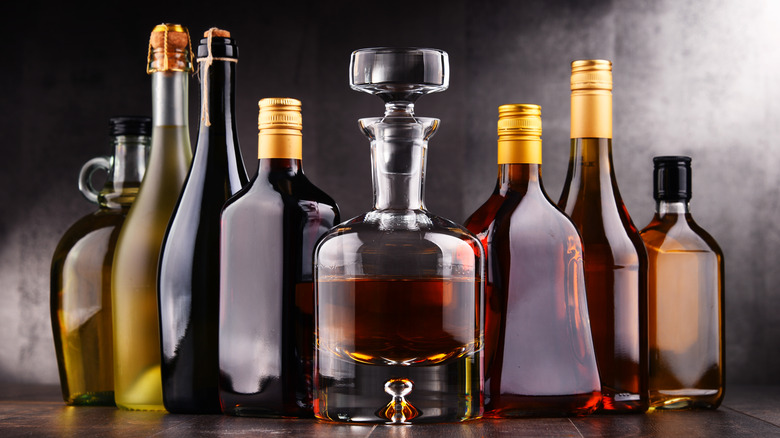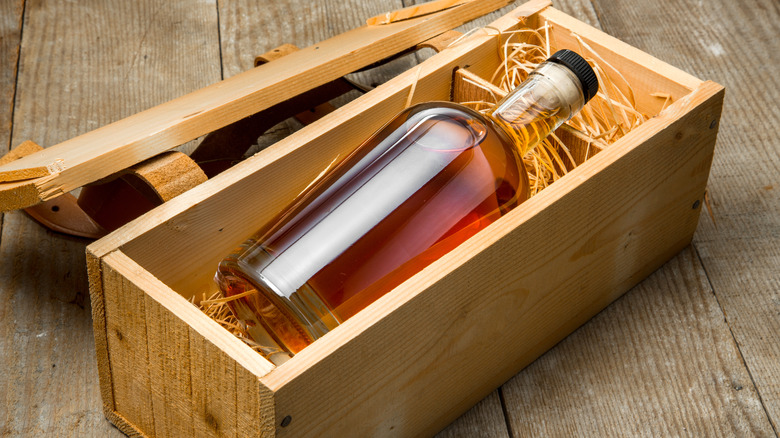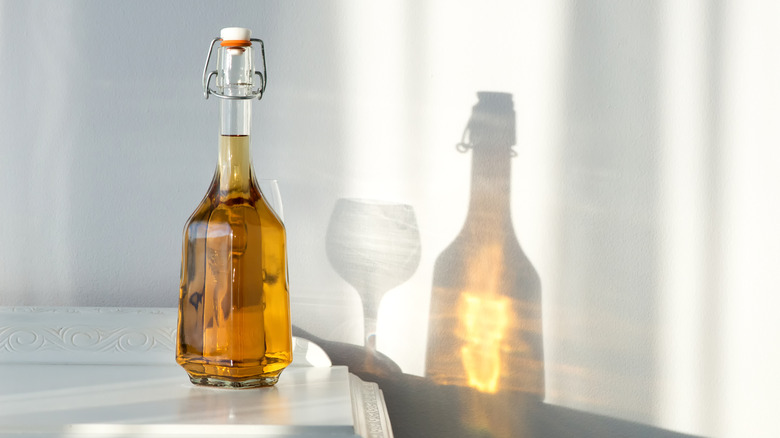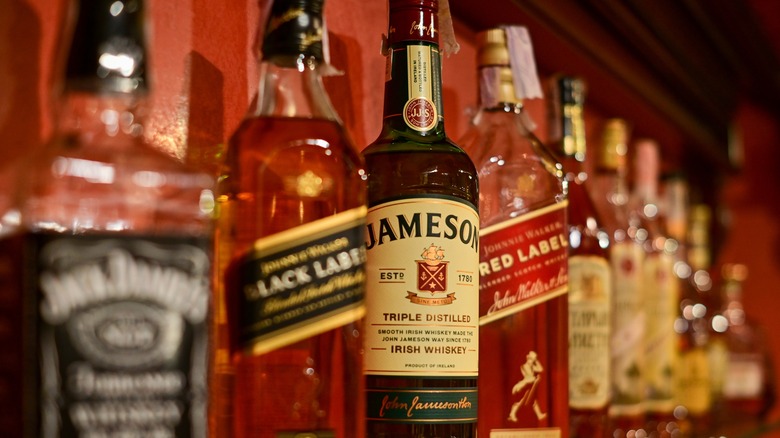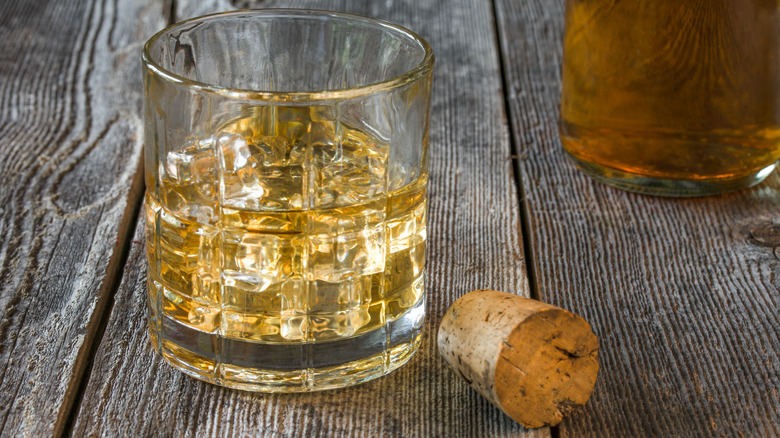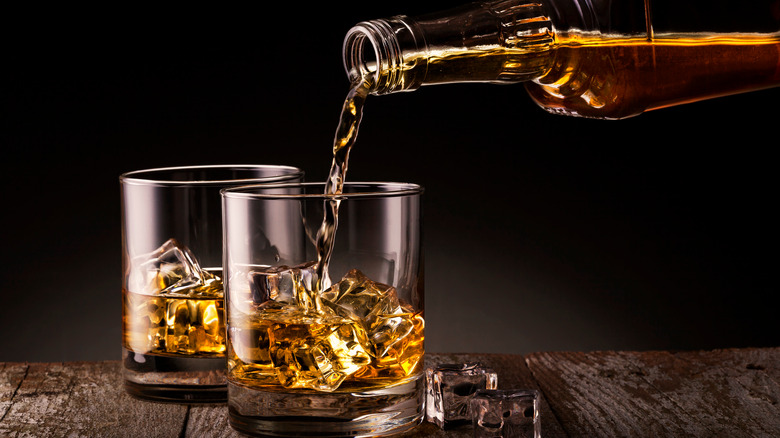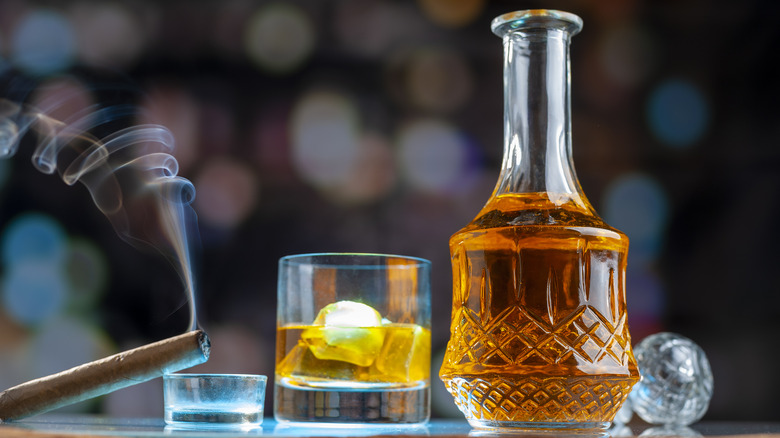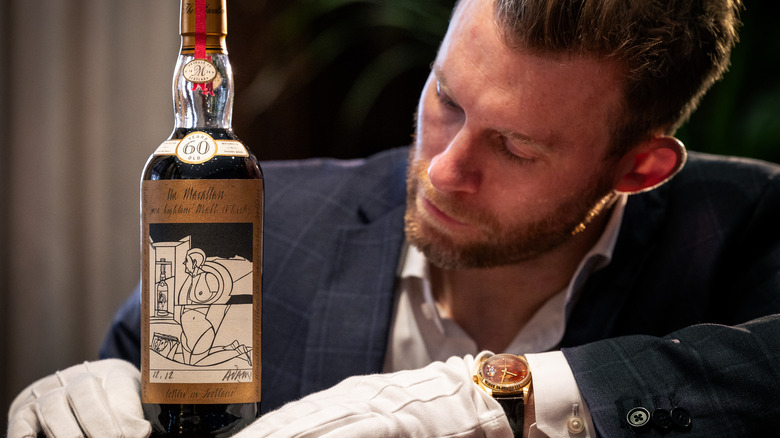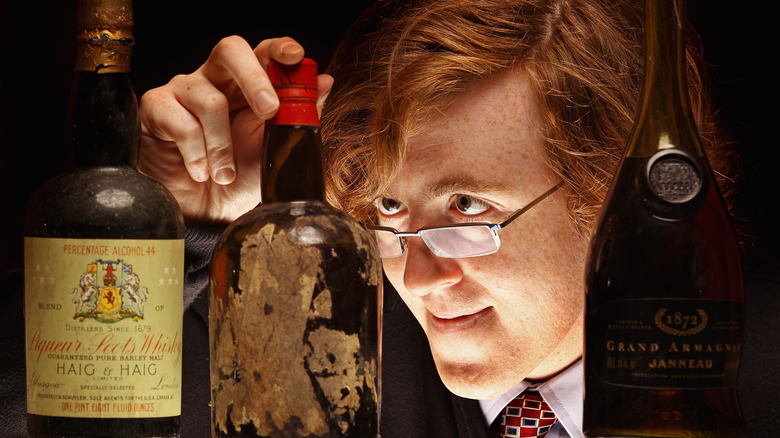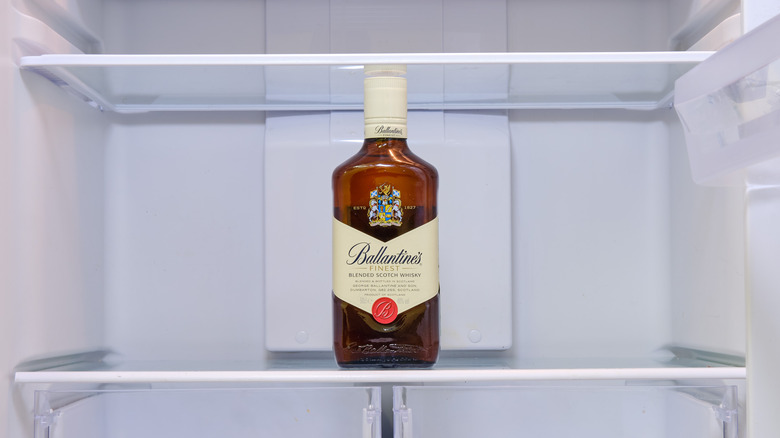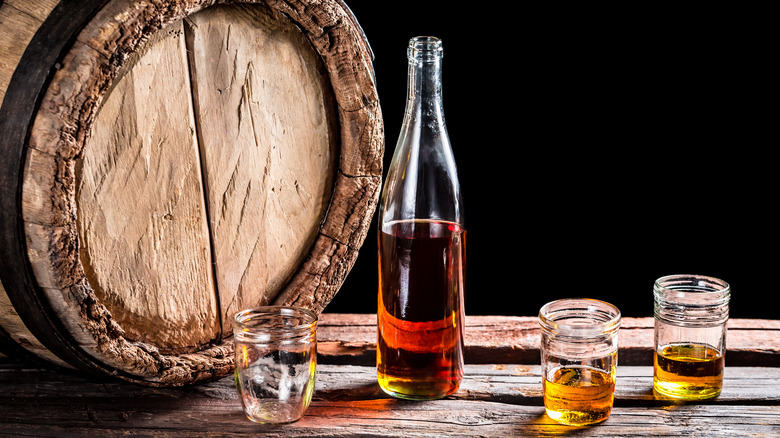12 Crucial Storage Tips For Your Good Whiskey
A good whiskey should definitely be savored. But unless you plan to polish off the entire bottle in one sitting, keeping your liquid gold properly stowed is a must. Improper whiskey storage can change the flavor of your high quality spirit and has an affect the alcohol's potency. Aside from the deterioration of flavor, the color of your whiskey can also fade or change over time.
Of course, exposure to things like oxygen and sunlight may happen on occasion. Even though whiskey technically doesn't go bad, per se, it will taste and look different if not properly kept. So if you want to thoroughly enjoy your unopened or opened bottle with every pour, there are a few things you need to do to preserve this spirit beyond putting it somewhere for safekeeping. Here are the top 12 important storage tips for your good whiskey that will help you maintain its original integrity.
Utilize the appropriate storage method
There is a slight difference between storing an unopened bottle and an opened one. If you have an unopened bottle of whiskey, place it in an area with a consistent temperature, away from humidity and bright lights. Typically, sunlight can do the most damage here, but exposure to intense artificial lighting over time can cause a quality issue as well. Nonetheless, keeping an unopened bottle in its original packaging or box is also recommended.
On the other hand, if you already have an opened a bottle of the good stuff, then you have to be mindful of how much is left and roughly how long before your whiskey expires. You can still place open bottles in a similar environment, or out of direct sunlight. But extra care is needed. Besides keeping the above-mentioned in mind, make sure that the bottle cap is secured tightly. Note that once it's opened, there's no need to store your whiskey in its original packaging since the seal has been broken, and the effects of oxidation are now at play.
Preserve in a cool and dry place
After choosing the proper storage method, make sure that you are storing your whiskey in a cool, dry place. Normally, pantries, cellars, and cabinets are great options for putting your whiskey away. Though it may be tempting to store a bottle or two in the fridge from time to time, most whiskey aficionados advise against it.
As a matter of fact, the fridge and the freezer are two places you should not store your good whiskey. The ideal temperature to keep whiskey at is around 55 to 60 degrees Fahrenheit to prevent them from evaporating or being less potent. Much like other high-alcohol content spirits, whiskey maintains its rich and unique flavor when kept away from fluctuating temperatures that are too cold. Your whiskey will also remain clear or translucent instead of cloudy. An added bonus here is that bottles stored in a cool and dry place also tend to taste better when being served.
Store away from the sun
When it comes to storing whiskey, it's crucial to keep this particular spirit out of direct sunlight, especially if the bottle is made of clear glass. This prevents ultraviolet rays from breaking down the organic compounds in the whiskey and gradually affecting the flavor as well as the aroma. By keeping your whiskey away from direct sunlight, it ensures that flavor nodes, scent, and overall color will not be altered while in storage.
That being said, accidental exposure will not instantly ruin your whiskey overnight, whether it's an opened or unopened bottle. However, it's important to note that lengthy periods of sunlight exposure can increase the rate of oxidation, especially when using a decanter or with already opened bottles of whiskey. Likewise, unopened bottles and those still in their original packaging can also incur similar adverse effects. Thus, you want to make sure you take the necessary steps to limit your spirits' time in the sun, even if you do not store it normally near direct sunlight.
Keep the bottle upright
Unlike other spirits, whiskey should not be stored on its side but rather upright. This due to the drink's high alcohol content. Storing whiskey on its side can cause the cork to deteriorate as it comes into contact with the whiskey, leading to many of the issues mentioned earlier — increased oxidation and change in taste, color, and aroma. Plus, it's much easier for your expensive spirit to spill out of the bottle when on its side and with a damaged cork.
It may seem a little taxing to ensure no bottle is ever on its side, but it's worth the effort to protect your expensive spirits. If you're just getting started with your whiskey collection, it's important to remember that whiskey cannot be stored horizontally like wine. Leaving bottles upright in their packaging and having a whiskey cabinet are two foolproof ways to keep everything in prime condition the next time you want to enjoy it.
Freshen up the cork
You can freshen up your cork by paying attention to its position. Don't make the mistake of letting the cork soak as it adds moisture back in and prevents it from drying out, possibly crumbling into your liquid gold. To freshen up the cork, simply flip unopened bottles a few times a year and any opened bottles occasionally. And as long as you store your bottle upright, no cork-related issues should arise.
Bottles of whiskey that you've already opened have a shorter shelf life than untouched ones. For open bottles, you can opt to purchase synthetic whiskey corks to use in place of the natural corks, which will allow you to still enjoy your opened bottle without worrying about moistening the cork. Synthetic corks provide a more airtight seal, which means you can keep your whiskey for a little longer. But if you haven't uncorked the good stuff just yet, then tilting the bottle periodically to keep it moist is still the best way to stop the cork from drying out or disintegrating.
Observe the 1/3 rule
If you want to preserve your whiskey for as long as possible after opening, you can observe the 1/3 rule. Generally, a bottle of whiskey that is two-thirds filled can safely be stored and won't go bad for up to a year. But when a bottle is only a third full, then its days are undoubtedly numbered. Even though this high alcohol content spirit does not expire, trying to save such a small amount isn't always the better choice.
In fact, most bottles of whiskey that have more air tend to have a shorter shelf life, especially when you keep whiskey in their original bottles. Thus, you should observe the 1/3 rule and polish off the remaining bottle rather than trying to store it. If you simply cannot finish off the bottle, then you can use the leftover spirit for a cocktail, like a tasty whiskey sour within the next month or consider a temporary storage solution such as transferring your whiskey to a smaller bottle.
Transfer to a whiskey decanter
If you have more than a third of a bottle left but not enough to justify putting it in storage, then it's recommended that you transfer your remaining spirit to a whiskey decanter. Though a decanter is often a smaller bottle, it helps maintain the quality of your opened whiskey. Top-notch decanters for whiskey have airtight seals, which protect against oxidation while still allowing for the whiskey's aroma and flavors to be enhanced via aeration.
What's more, this classy container comes in handy when you are enjoying rarer whiskeys. Since sentiment or debris can build up over time with whiskey, transferring your spirit to a decanter can help leave all those harmless yet off-putting particles behind. Decanters are visually appealing and a great way to showcase your whiskey collection and a perfect option for temporary storage. And when you use your decanter in tandem with preserving sprays — gas-based (argon or nitrogen) sprays that act as a barrier between your whiskey and any oxygen in the bottle — you can keep your whiskey neat a little longer. As a matter of fact, you can store whiskey in a decanter (one made specifically for this spirit) for up to three months.
Maintain the bottle
Costly whiskey is not only smoother and tastes more refined, but it's also a showpiece for most home bars and cellars. Good whiskey is an investment, so it only makes sense that you should maintain the bottle(s). When showing off your priceless whiskeys, remember to take extra care, which includes preserving the label and more. If you have quite a collection of the rarer whiskies, you may want to consider insurance as well as off-site storage to protect your investment.
It's also worth noting that owners of good whiskey who are transporting their collection or moving with a few bottles in tow need to ensure that their investment is properly protected. From insulated packaging to sturdy boxes that keep your bottles in place, your whiskey needs to be handled with the utmost care. While you're at it, don't forget to keep your whiskeys at a consistent temperature and out of direct sunlight when en route.
Avoid over-handling
Similarly, over-handling your bottles of whiskey can interfere with your otherwise well-kept whiskey collection. Not only can the oils from your skin transfer to pricey labels, it can also lead to unsightly smudged bottles and even accidentally breaking priceless vintages. While it may sound strange not to fawn over your whiskeys every chance you get, it's best to just let them be.
Of course, with bottles you are currently savoring or decanting, you don't have to worry as much about wear and tear to labels. But you should still limit how often you or others are appreciating your whiskey. Doing so will help to prevent accidental spills and damage, along with the possibility of leaving the good stuff somewhere you shouldn't. That being said, most opened bottles should be polished off within two months or less from opening for the best taste, aromas, and flavors. Thus, avoiding excessively handling your uncorked spirits should be a lot easier to do.
Keep open bottles away from strong odors
Though whiskey is often served at room temperature, some people like to store their whiskey in a wine fridge, basement, or cellar. While these are acceptable locations to store, it's crucial that you keep any open bottles away from strong odors. Even unopened bottles have been known to absorb nearby odors. To protect your investment and your favorite drink, avoid storing any bottles near strong-smelling foods, cleaning products, or anything else that is likely to make its way into your whiskey's flavor nodes.
In addition to keeping your collection away from surrounding odors as best as possible, try to avoid storing your whiskeys near heat sources, including ovens, fireplaces, furnaces, and so on. There's no denying the fact that whiskey and spirits in general are highly flammable. Do yourself a favor and equip your storage area with a fire extinguisher and don't store whiskey anywhere that could go up in flames. And if you plan on keeping your good whiskey in a cellar or basement, make sure flood damage is not a possibility.
Mind the age of your whiskey
While whiskey does't necessarily expire, and properly stored bottles can last for decades, some brands simply do not get better with age. Do your research when selecting your favorite spirits. Whiskey collectors should also be aware that once a bottle is uncorked, it's only a matter of time before their whiskey will "go bad." Still, if you take all the necessary precautions and keep your whiskeys in an amenable and safe environment, then there's no reason one cannot enjoy an opened bottle for many months.
That said, newer collectors who have a rare vintage or two may not know how to date or tell the age of their whiskey. There are several ways to determine the age of a bottle. By looking at the glass dates, tax strips, or UPC codes, you can quickly tell what year you are dealing with. Glass dates, or two digits for the year, can be found at the bottom of more recent whiskeys. Tax strips, on the other hand, have been around for almost 100 years, comes in different colors (blue, green, or red), and have a specific design. Lastly, UPC codes often indicate that your whiskey was most likely bottled in the late 1970s to early 1980s.
Make use of whiskey you don't like
A parting whiskey storage tip that may seem a little obvious is to make use of whiskey you don't like. Thus, if you open a bottle and find that you're not in love with it, why not make the most of it by using it in other ways? You can use the whiskey for cooking, such as making glazes, sauces, and more. You can also make a large batch of cocktails for any upcoming shindigs.
Alternatively, gifting the whiskey you dislike to friends and family is another way to put your liquid gold to good use. The choice is yours to make. It's important to save that perfect storage space for the good stuff, rare finds, and the ones you can't live without. Ultimately, storing good whiskey takes some work. But with the help of these recommendations mentioned above, getting your collection together, preserving your investment, and enjoying this spirit for a long time becomes a little less taxing and more than possible.
